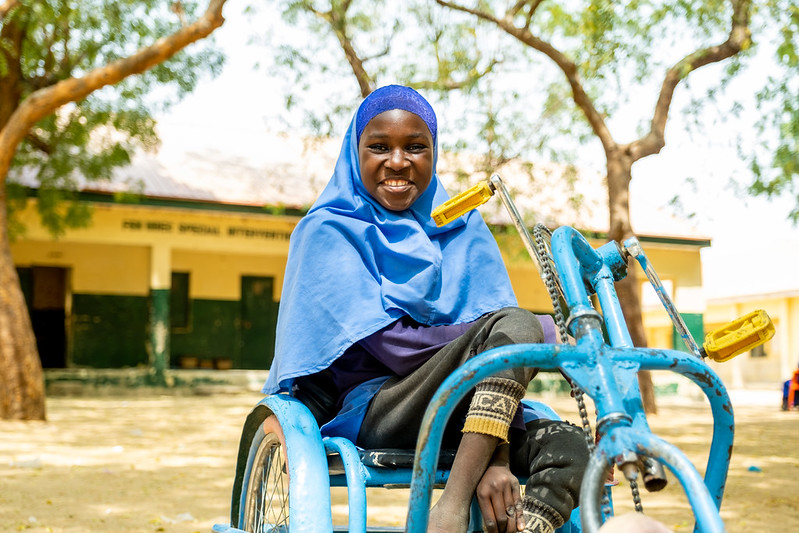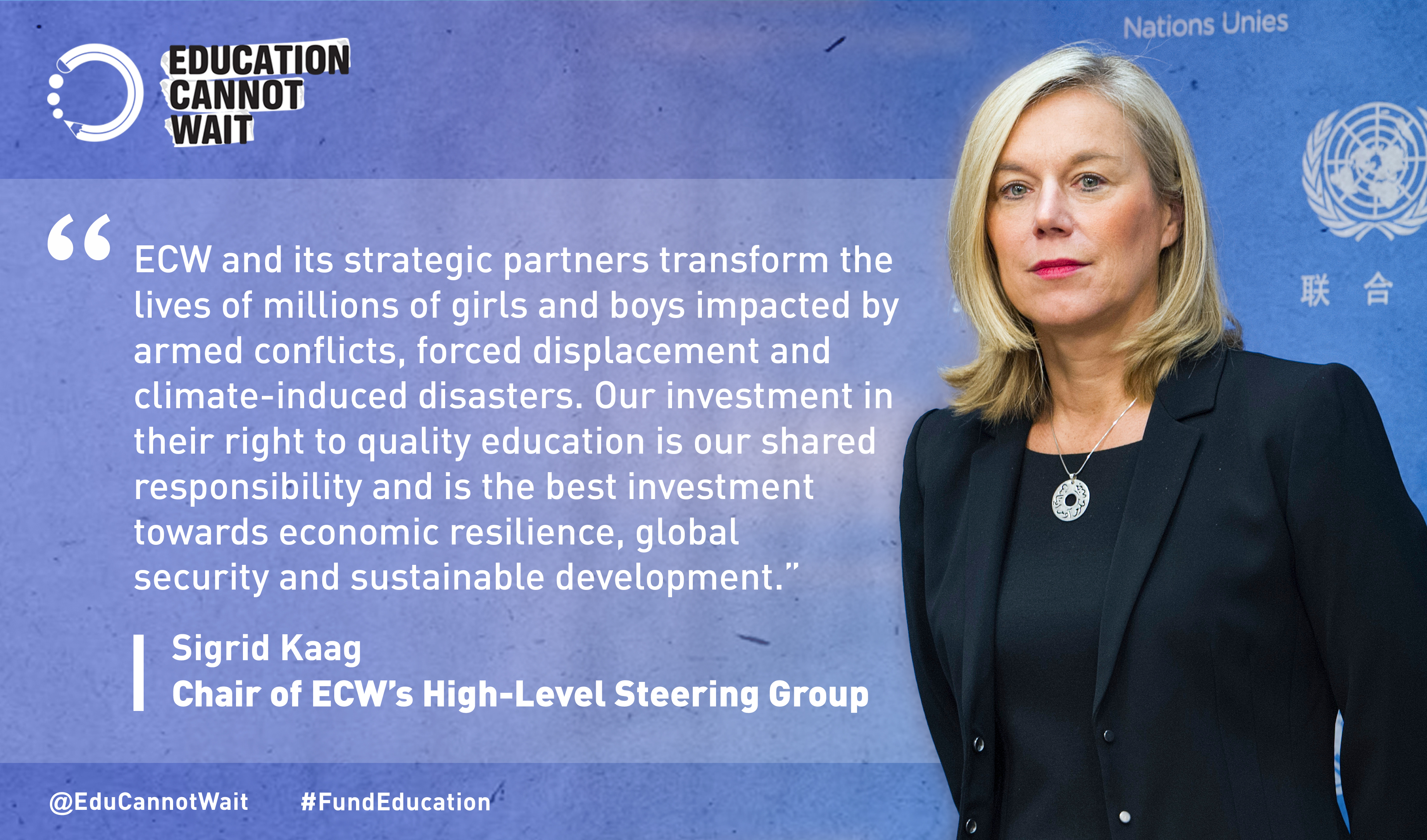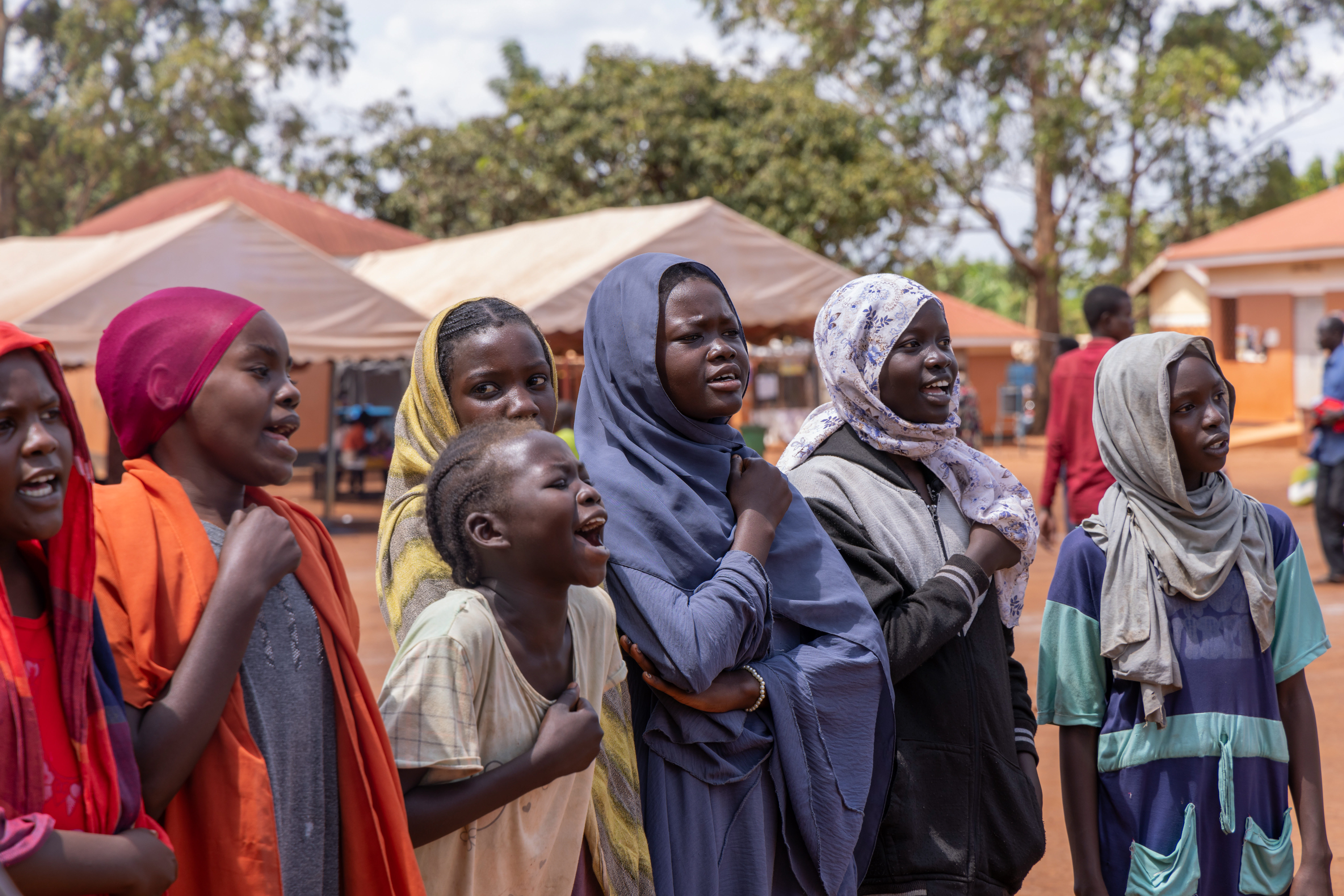Education Cannot Wait Provides Direly Needed Education Opportunities to 1.4 Million Children and Youth Caught in the World’s Worst Humanitarian Crises in Its First Two Years of Operation
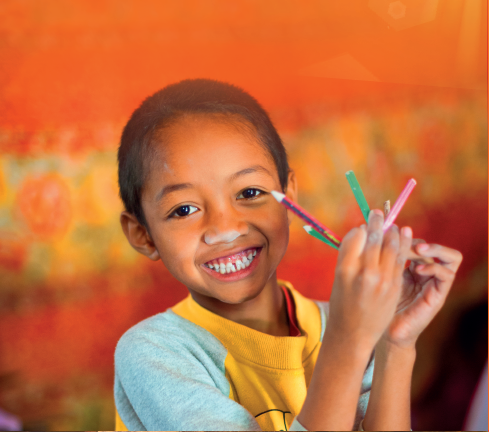
THE GLOBAL FUND FOR EDUCATION IN EMERGENCIES AND ITS RANGE OF PARTNERS ARE SHIFTING THE NEEDLE FOR EDUCATION TO BE A PRIORITY IN HUMANITARIAN RESPONSES TO ENSURE NO CHILD IS LEFT BEHIND

Education Cannot Wait reached more than 1.4 million children and youth caught in armed conflicts, forced displacement, natural disasters and protracted crises in its first two years of operation, according to the Fund’s 2018 Annual Report, launched today at the United Nations in Geneva by the Director of the Education Cannot Wait Global Fund, Yasmine Sherif.
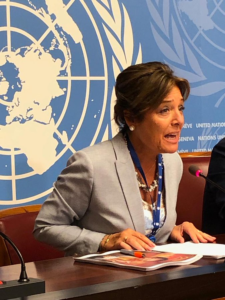
“Nearly one and a half million children and youth furthest left behind in conflicts, forced displacement and disasters have been given the hope, opportunity and safety of a quality education,” said Yasmine Sherif. These girls and boys are now benefitting from quality, inclusive education, helping them to cope with the trauma and stress of crises, and to regain the chance to develop to their full potential and arise out of their suffering.
Education Cannot Wait (ECW) is the first global fund for education in emergencies and it seeks to mobilize US$1.8 billion by 2021 to reach 9 million children and youth living in crises and displacement. ECW works to bring those furthest behind to the forefront; of the children and youth reached, almost 50 per cent are girls, 46 per cent are refugees and internally displaced persons, and 14,000 are children with disabilities. In situations of conflict, forced displacement and disasters, these children and youth are too often the most marginalized. Without access to education, they face high risks of exploitation and abuse, sexual violence, early marriage and pregnancies, forced recruitment by armed groups as well as toxic stress and trauma.
The report also shows that ECW is increasing the speed of delivering education in emergency responses in new or escalating crises. Through its emergency funding allocations, in-country responders were able to rapidly provide or restore learning opportunities to children and adolescents in sudden onset crises such as during the new displacements in the Democratic Republic in the Congo and the new displacements in Nigeria.
Beyond short-term responses, ECW is also pioneering joint programmes to advance humanitarian and development coherence, supporting a crucial shift of the aid system to provide continuous quality, inclusive education in protracted crises and forced displacement contexts that very often last longer than the average school curriculum.
In 2018, ECW and its partners launched four ground-breaking Multi-Year Resilience Programmes to deliver longer-term education solutions to crisis-affected girls and boys in Afghanistan, Bangladesh, Central Africa Republic and Uganda. In partnership with strategic donors, national governments, communities, UN agencies, NGOs and private sector partners, ECW has laid the ground for such multi-year education responses to be launched in a total of 25 priority countries affected by crises by 2021.
Protection, access, quality learning outcomes and gender equality are top priorities across ECW’s investments. The Fund also promotes safe, inclusive learning environments and gender-sensitive programmes through a wide range of interventions. These include supporting the training of female teachers, the provision of psycho-social support, support to children’s transportation to and from schools, support for the inclusion of refugee children in host-countries national education systems, support to teacher training and incentives, temporary learning structures, remedial classes, non-formal education and vocational training opportunities, etc.
ECW also exceeded its target in supporting the aid localization agenda and the Grand Bargain commitments, with close to 30 per cent of its funding going as directly as possible to local responders, according to the report. “ECW is a catalyst for collective efforts. Its diverse range of local, national and international partners are devoted to building locally owned and sustainable solutions to bring quality education to millions more children and youth living in crises who don’t have access to an education,” Sherif said. “Only by working together and staying firm on our commitments can we accelerate advancement towards the Sustainable Development Goals, especially SDG4, which calls on world leaders to ensure education for every girl and boy by 2030.”
Since its inception, ECW has mobilized US$460 million to date to support children and youth living in 29 countries – with a total of US$333.5 million mobilized by the end of 2018, according to the report. And, as a result of ongoing advocacy and resource mobilization efforts of ECW, 15 strategic donor partners, civil society organizations, national governments and UN Agencies, the crucial role of education in crisis settings and the urgent need for increased funding is increasingly recognized on the global political agenda.
This is shown by recent unprecedented commitments by key stakeholders: the United Kingdom’s Department of International Development £90 million contribution to ECW at the G7 this month; the European Union’s announcement to devote 10 per cent of its humanitarian aid budget to education; and, the landmark G7 2018 Charlevoix Declaration on girls’ education in crisis.
However, despite the well-documented potential of education as an enabler to break cycles of poverty and protracted crises, and while donors have increased their focus on education in emergencies and protracted crises, the funding gap for education in emergency and crisis settings remains very large. According to the report, 56 per cent of the total amount of resources needed for education in emergencies appeals were unfunded in 2018, and the share of funding for education in emergencies increased only slightly – from 3.8 to 4.3 per cent of all humanitarian funding in 2018. ECW and its partners continue to appeal to governments, private sector, and philanthropic organizations to urgently mobilize $1.8 billion in funding for education in emergencies and protracted crisis by 2021 to support 9 million children annually
Results Highlights 2018*
- 1,413,936 crisis-affected children and youth reached
- 47% girls, 46% refugees and internally displaced, 14,000 children with disabilities
- 2,798 classrooms built or rehabilitated
- 726,610 children received individual learning materials
- 20,047 teachers trained – 44% female
- 78,425 children supported through early childhood education – 52% girls
- 44% of ECW-supported countries promoted the use of a teacher’s code of conduct
- 50% of ECW-supported countries trained teachers in psychosocial support
- 33% of ECW-supported countries provided psycho-social support services
Note:
*Children are reached through a comprehensive approach with different types of assistance that are context-specific (e.g. upgraded learning spaces, teachers trained or financially supported, learning materials, school feeding, etc.) Figures on the number of children and teachers reached are cumulative for the calendar year 2018, based on reports from ECW grants active in 2018. The total number of children reached does not include data for Yemen. Due to the highly complex nature of the crisis, about 1.3 million children in Yemen were supported to take end-of-cycle exams and received food rations. As this type of assistance is different from the assistance provided in other countries, beneficiaries are featured separately pending further aggregation of data.
About Education Cannot Wait (ECW):
ECW is the first global fund dedicated to education in emergencies. It was launched by international humanitarian and development aid actors, along with public and private donors, to address the urgent education needs of 75 million children and youth in conflict and crisis settings. ECW’s investment modalities are designed to usher in a more collaborative approach among actors on the ground, ensuring relief and development organizations join forces to achieve education outcomes. Education Cannot Wait is hosted by UNICEF. The Fund is administered under UNICEF’s financial, human resources and administrative rules and regulations, while operations are run by the Fund’s own independent governance structure.
To date, ECW has invested in education in emergencies for children in the following countries affected by crises: Afghanistan, Bangladesh, Brazil, Cameroon, Central African Republic, Chad, Colombia, Comoros, Democratic Republic of the Congo, Ecuador, Ethiopia, Indonesia, Lebanon, Madagascar, Malawi, Mozambique, Nepal, Nigeria, State of Palestine, Papua-New Guinea, Peru, Somalia, Syria, Uganda, Ukraine, Venezuela (regional response), Yemen, Zimbabwe.
Please follow on Twitter: @EduCannotWait @YasmineSherif1 @KentPage
Additional information available at: www.educationcannotwait.org and www.act4education.org
For press inquiries, please contact:
Anouk Desgroseilliers, adesgroseilliers@educationcannotwait.org, +1-917-640-6820
For any other inquiries, please contact:
info@educationcannotwait.org
For Press Inquiries:
Anouk Desgroseilliers:
adesgroseilliers@un-ecw.org
+1-917-640-6820
Kent Page:
kpage@unicef.org
+1-917-302-1735

